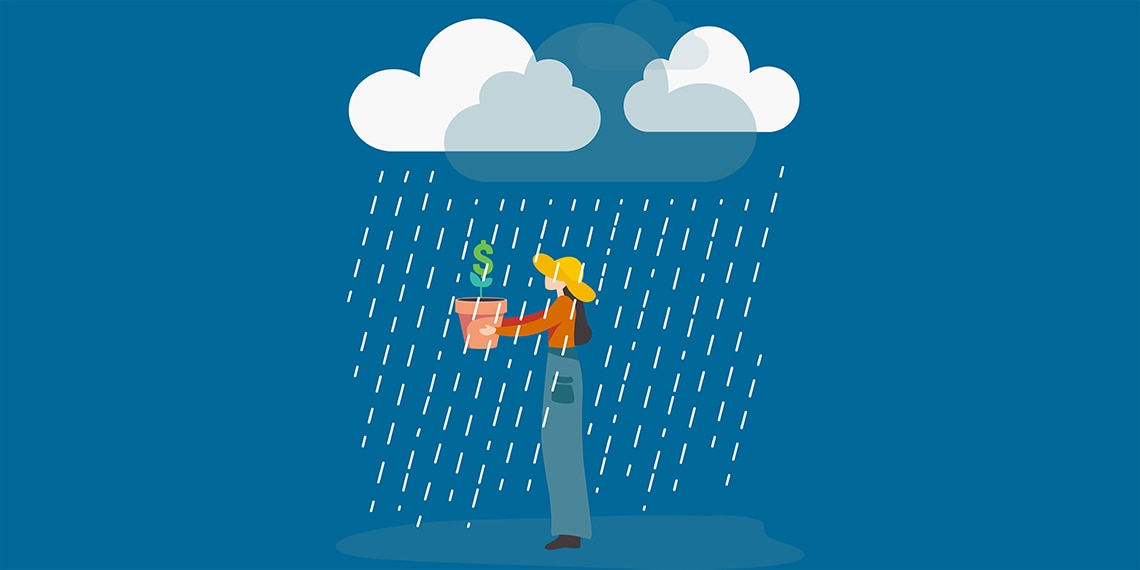
Are you ready for financial turbulence? Many people are not, even though ups and downs are certain to happen. Before the pandemic, for example, about one-third of American families weren’t financially prepared for the disruption of even a mid-sized financial shock. Preparation against the unknown is an essential part of developing so-called financial resilience—the ability to withstand a job loss, an economic downturn or anything that impacts your income or savings. Being financially resilient doesn’t mean having a lot of money. It’s about being smart and proactive with the money you have, so you can feel more confident that your finances are ready today for whatever happens tomorrow.
1
Crunch the Numbers
Start by tracking how much money is coming in—and exactly where it’s going out. Budgeting doesn’t have to be complicated; you can use apps or even just a notepad. But opening this key window into your finances is the first step away from living paycheck to paycheck and toward financial resiliency.
2
Snip Your Spending
Sure, spending depletes your savings, which decreases your resilience. But it becomes a problem when you regularly spend more than you can afford. The good news: You can most likely find expenses to cut. Comb through your payments, both monthly and day to day: What aren’t you using? What can you do without? Every little bit helps.
3
Build Your Emergency Fund
With your baseline established and optimized, it’s time to assess how much you can afford to save for emergencies. You’re planning for the future, so even if you’re only setting aside a little each month, the amount will grow with interest when you use a high yield savings account, CD or money market account.
4
Play the Long Game
Keeping the future in mind will help you stay prepared for what comes next. Look at what you need for medium-term needs, like big purchases, and begin to save for retirement. That may seem a long way off, but starting now will make you that much more resilient down the line.
5
Always Keep Learning
Having a steady income can help you stay resilient in your spending and saving. Lots of factors can disrupt employment, of course, but having transferable, marketable skills will make it easier to find work if you lose your job. Figure out what knowledge you need to reach the next level at your current job or pivot into a new career, then start making it happen.
6
Network, Network, Network
A whopping 80% of positions that are filled are never advertised. In other words, knowing people is essential for learning about openings and for helping you stand out among hundreds of applicants. Build your network by joining organizations, going to industry events and connecting with other professionals on social media.
7
Own Your Weaknesses
Take a holistic look at areas of your financial life where you may have blind spots or uncertainties. Do you have adequate health insurance for your situation? How long will your emergency fund last? Identifying and admitting your weaknesses are the first steps in strengthening them—and that’s what resilience is all about.
8
Vet Your Debt
Debt can be a smart part of your budget, especially when interest rates are low. But taking on too much debt, or the wrong kind, could be a recipe for trouble. Learning about the types of debt and how they function can help you start managing your debt efficiently and effectively—and reducing debt if necessary.
9
Calculate Risk
Taking chances can result in great rewards, but it wouldn’t be a “risk” without potential downsides—and that may require stomaching some financial ups and downs. Understanding your personal risk tolerance, as well as the risk of your investments, will help you stick to your plan during uncertain times.
10
Make the Investment
Once you’ve assessed your risk tolerance (and it’s crucial to do that first), learn to invest your money. What’s the best vehicle for you to grow your wealth? What stocks, bonds or assets will increase in value? The result could grow your nest egg while boosting your resiliency.
11
Plan With Your Clan
Those close to you can help with your path to resiliency—if they know what’s going on. Talk with your partner or family to make sure everyone’s on the same financial page, especially if they depend on you for income. And remember, money conversations can take time; don’t rush them.
12
Get Your Read On
The more you know about banking terms, the economy and investments, the better your money decisions can be. Work with a financial advisor, talk with family and friends, stay as current as you can with business news and consume other financial content on books, videos and podcasts.
13
Celebrate Small Wins
Nothing happens overnight—especially when it comes to building financial resilience. Set small goals and reward yourself for hitting them, then move the bar a little higher. You’re in this for the long haul, so take time out to celebrate your efforts to create a more resilient you.
Rich Beattie is a former executive digital editor of Travel + Leisure and has written for outlets such as The New York Times, Popular Science, New York Magazine and SKI.
Your resilience starts with being prepared. Opening a RVC high yield savings account can be an important step in your financial wellness journey. Explore your options today and start preparing for tomorrow.

